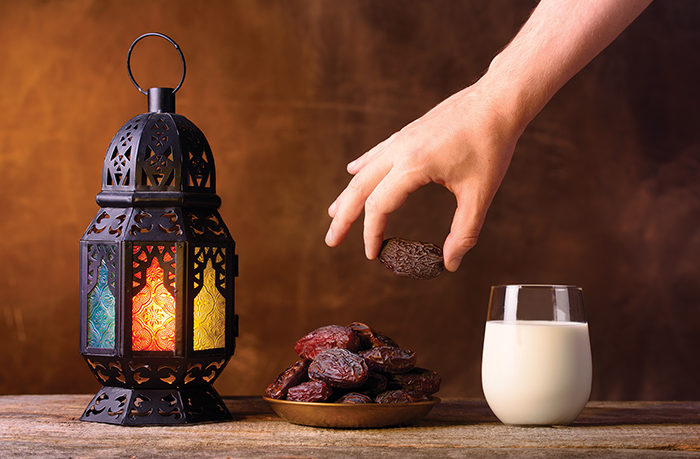By Fariha Eshrat
As the month of practicing self-control and mindfulness returns, let’s take a look at the perfect opportunity for us to introduce and practice our healthy lifestyle goals.
As Muslims around the globe start this holy month with the hope of becoming more conscious of God, it is important to emphasize the role of healthy living among our responsibilities. The blessed Prophet said: ìTake advantage of the good health before illnesses afflict youî. Here we tried to break down some of the most important take home points to help you have a healthy Ramadan.
Replenish Your Fluids
Two-thirds of our body weight is water, making it an important medium for all cells’ functions. Two liters or 8 glasses of water is the commonly preached goal, however scientific research shows every personís fluid needs are different and you should drink based on your thirst and needs. Soups, juices, smoothies, watery fruits all add towards your daily total water intake and are ideal for futoor, while caffeinated beverages will increase water loss and cause dehydration. During these hot summer day fasts, try to schedule strenuous activity overnight so you can reduce your water loss by sweating during the day. Be sure to remain mindful of your body’s water needs and drink up. Micturition is a useful tool to assess your hydration status, 6-8 times a day is average and anything significantly less warrants your attention.
Consume Complex Carbs
Complex carbohydrates are foods that will help release energy slowly throughout the day, such as oats, semolina, beans, whole grain bread and pasta, brown and basmati rice, starchy vegetables etc. These are rich in fibers and other complex carbohydrates that take time to digest, helping you feel full for longer and can help maintain a constant blood sugar level. Simple refined sugars give you a spike of blood sugar which can leave you feeling fatigued soon after. A meal rich in complex carbs is ideal for suhoor.
Pack on the Proteins
Meat, poultry, fish, lentils and beans are ideal sources of protein. These are more energy dense than carbohydrates and supply important amino acids to help your body repair overnight. Make sure to include proteins as one-third of your meal. Fats are also energy dense but need to be chosen with more care. Animal fats like butter are less ideal for all, while natural plant fats such as those found in coconuts, avocados, nuts and olives can be an important source for this essential nutrient. Incorporating these sources and oily fish can help you get the right balance of fats in your diet. These are ideal for dinner and suhoor.
Airfry and Bake
Avoiding fried foods in their entirety would probably be great for your health, but most people will not go through Ramadan without samosas. Airfrying has recently emerged as an alternative, while traditional options like baking as still much healthier than deep frying. Some healthy options for heat stable oils include coconut oil, peanut oil and canola oil. Avoid hydrogenated oils like shortening because of their high trans-fat content.
Select Good Snacks
During your evening and night hours, keep some good snacks at hand. Fruits and vegetables with your favorite dips, nuts and fresh juices are perfect for nibbling on. Snacks can help you consume your daily intake needs by breaking your meals down into smaller portions and keeping your energy up to do important work overnight. Keeping healthy snacks at hand will save you from many mindless calories that don’t provide you much nutrition.
Exercise
Exercising in Ramadan is ideal after taraweeh. During this time, you can easily drink up after your workouts and can place the session between meals. Be mindful of your body’s needs and alter your workout plan if you feel you cannot keep it up during the month. It can be especially difficult over the first few days of Ramadan while your body is still acclimatizing to the new pattern of eating. If you have yet to follow a regular workout plan, your mindfulness and spirituality during this month of forming good habits and losing the bad ones could be the perfect spring in your step towards fitness. Start small and be consistent. Exercising has numerous benefits on your heart and muscle health that can help you face fasting with greater stamina.
Get Sufficient Sleep
Ramadan tends to change our sleep schedules significantly. Remember that 6-9 hours of sleep is the research recommendation. Keeping a sleep schedule closest to your yearly pattern will greatly help in maintaining your natural Circadian rhythm and keep you energetic throughout the day. If that isnít possible, try to find time overnight at least for a nap. If youíre sleeping during the day, try to keep sunlight away using sleeping masks and dark rooms to help you get restful sleep. Blue light filters on your screen and winding down activity near bedtime are useful strategies in controlling your sleepiness.
“Eat of the good and wholesome things that We have provided for your sustenance, but indulge in no excess therein.” [81:20; Quran]
Moderation is key, so even when you enjoy some kunafa or fries, remember to be mindful of your portions. Once you make the conscious effort to fill your plate with complex carbs, healthy fats and lean proteins first, you will have given your body a more nutritious meal and will leave less space for the deep-fried, sugar-dipped cravings of your choice. Let’s take a more holistic approach to health this Ramadan, so that we can be healthy and fit to share many more Ramadans with our loved ones.




